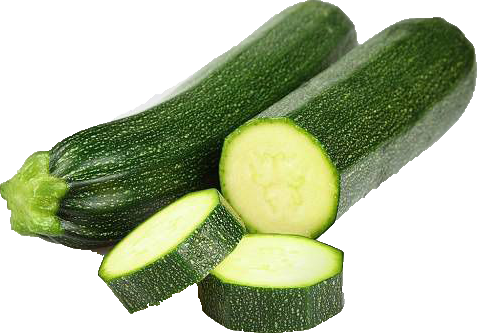|
Zucchini is one
of the very low calorie vegetables; provide only 17 calories per 100 g. It
contains no saturated fats or cholesterol. Its peel is good source of dietary fibre
that helps reduce constipation and offers some protection against colon
cancers.
Zucchinis have
anti-oxidant value (Oxygen radical absorbance capacity- ORAC) of 180 Trolex
Equivalents (TE) per 100g, the value which is far below to some of the berries,
and vegetables. Nonetheless, the pods are one of the common vegetables included
in weight reduction and cholesterol control programs by the dieticians.
Furthermore,
zucchinis, especially golden skin varieties, are rich in flavonoid
poly-phenolic antioxidants such as carotenes, lutein and zeaxanthin. These
compounds help scavenge harmful oxygen-derived free radicals and reactive
oxygen species (ROS) from the body that play a role in aging and various
disease processes.
Courgette is a
relatively moderate source of folates, provides of 24 µg or 6% of RDA per 100
g. Folates are important in cell division and DNA synthesis. When taken
adequately before pregnancy, it can help prevent neural tube defects in the
fetus.
It is a very good
source of potassium, an important intra-cellular electrolyte. Potassium is a
heart-friendly electrolyte and helps bring the reduction in blood pressure and
heart rates by countering pressure-effects of sodium.
Fresh fruits are
rich in vitamin A; provide about 200 IU per 100 g.
Fresh pods,
indeed, are good source of anti-oxidant vitamin-C. Provide about 17.9 µg or 30%
of daily-required levels per 100 g.
In addition, they
contain moderate levels of B-complex group of vitamins like thiamin,
pyridoxine, riboflavin and minerals like iron, manganese, phosphorus, and zinc.
Helps to Lose
Weight: You might be surprised to know that consuming zucchini will help
you to lose weight considerably. Zucchini is extremely low in calories, but it
gives you the feeling of being full. Therefore, zucchini is a great way to
satisfy your appetite without grabbing calories and starting a crash diet plan.
Apart from the low calorie count, zucchini has a high water content and is rich
in fibre. Hence, when you eat zucchini, your stomach is not empty, thereby
making zucchini recipes perfect if you are on diet.
Maintains Optimal
Health: As an outstanding source of manganese and vitamin C, zucchini is
the best source of dietary fibre that will keep your body in the best shape for
the long run. It also contains vitamin A, magnesium, folate, potassium, copper,
and phosphorus. This summer squash also has a high content of omega-3 fatty
acids, zinc, niacin, and protein. Moreover, vitamin B1, vitamin B6, vitamin B2,
and calcium in zucchini assure optimal health. Zucchini is probably the best
example of squash that has such a rich array of nutrients, including sugar,
carbohydrates, soluble and insoluble fibre, sodium, minerals, amino acids and
more. The folate ingredient of zucchini is highly commendable for pregnant
women as well.
Promotes Men’s Health: Many researchers have taken extracts from this squash to
conduct certain studies and concluded that this fruit has certain properties
that effectively treat an ailment in men called BPH or benign prostatic
hypertrophy. When the prostate gland becomes enlarged in an odd shape and size,
which can cause trouble with both sexual and urinary function – this is known
as prostatic hypertrophy. A good treatment of this is seen in combination with
other foods that contain phytonutrients; zucchini is said to be extremely
useful in decreasing BPH symptoms.
Keeps You
Disease-Free: Your overall health will surely improve if
you consume zucchini regularly. It helps you prevent all kinds of diseases in a
general sense. Studies have already declared that fibre-rich foods help to
alleviate cancer conditions by washing away the cancer-causing toxins from
cells in the colon. The vitamin C, folate and beta-carotene content in zucchini
helps to protect these cells from the harmful chemicals that can lead to colon
cancer. Beta-carotene and vitamin C also have anti-inflammatory properties,
thereby naturally curing ailments like osteoarthritis, asthma, and rheumatoid
arthritis, where swelling is immensely painful. The copper percentage in
zucchini also helps in reducing the aching symptoms of rheumatoid arthritis.
Overall
Cardiovascular Protection: Zucchini is rich in
nutritional value, especially during the summer, when it delivers countless
advantages to the body. The food ranking systems in zucchini-rich countries
have declared this squash has abundant of manganese and vitamin C that helps to
keep the heart strong.
During the research, most of these nutrients
are shown to be effective in the prevention of diabetic heart disease and
atherosclerosis. The magnesium content notably reduces the risk of heart
attacks and strokes. In combination with potassium, magnesium also helps in
reducing high blood pressure. The vitamin C and beta-carotene found in summer
squash helps in preventing the oxidation of cholesterol. Oxidized cholesterol
builds up on blood vessel walls, but these nutrients reduce the development of
atherosclerosis. The vitamin folate is required by the body to eliminate an
unsafe metabolic by-product called homocysteine, which can result in heart
attacks and strokes if the levels rise too high. Zucchini’s fibre content
lowers high cholesterol levels as well, thereby helping reduce the risk of
atherosclerosis and heart disease due to diabetes.
|

